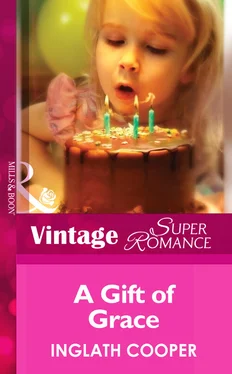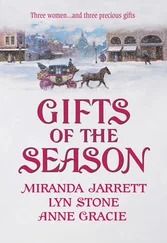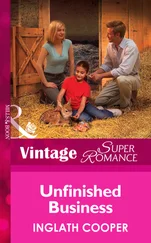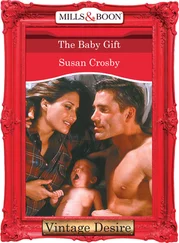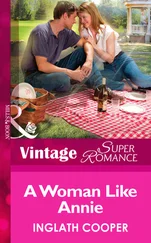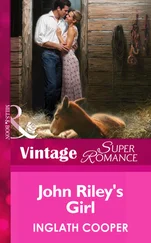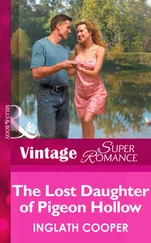As soon as they were out of earshot, Darcy blew out a snort of disbelief. “Oh, my gosh. You grew up with that?”
Sophie shrugged. “You learn to ignore her.”
“Sophie. No one should have to put up with that. Why do you let her come at all?”
She was quiet for a moment, and then said, “They’re the only family I have.”
“Some family.”
Sophie glanced down, rubbed a thumb across the back of her hand.
Darcy squeezed her arm. “I’m sorry. That sounded awful.”
“It’s okay, Darc. I know how it looks. Maybe I should have cut the ties long ago, but she was my mother’s sister. They were nothing alike, but she’s the last link I have.”
“It’s a shame we don’t get to pick our relatives,” Darcy said.
“I have no intention of letting her ruin this party. So if you don’t mind, I’d rather not talk about her.”
“Sure,” Darcy said, sympathy in her voice.
“I’d better check on the sandwich trays,” Sophie said and headed for the kitchen.
WHEN SOPHIE CAME BACK out a few minutes later, Mr. Crawford had put the two donkeys in the shade with a little hay to nibble on. All the children gathered around the picnic table for cake and ice cream. Most of them ended up wearing as much on their clothes as they managed to eat, eating with the kind of unrestrained pleasure children show for simple things.
On the invitation, Sophie had asked that the guests not bring presents but items to donate to the local animal shelter in Grace’s name instead. The box by the picnic table was full with paper towels, canned food, detergent, everyday items the shelter needed to stay in operation.
The children played games for forty-five minutes or so, Red Rover, Simon Says and jump rope. They all took one last ride on Oscar and Lulu, and then it was time for Mr. Crawford to load the donkeys up and take them home.
Once he’d gone, some of the children began to leave. Those whose mothers hadn’t yet come to pick them up remained, and a new game of Red Rover began.
From across the yard, Sophie watched Ruby single Grace out and kneel down beside her, one hand pushing Grace’s blond hair back from her face where it had escaped her ponytail. Some protective instinct surged inside her, and it was all she could do not to storm over and sweep her daughter up in her arms.
A couple of minutes later, Ruby walked over and said it was time for them to go. “You’ve made a nice home for yourself, Sophie. You and Grace. I hope you’re happy.”
“We are,” Sophie said, hearing the defensiveness in her own voice.
Ruby reached inside her oversize purse and pulled out what looked like some kind of legal document. “Oh, and by the way, there’s a little something I need for you to sign.”
“What is it?” Sophie asked, surprised.
“The land my daddy left to me and your mama. Roy and I have decided we’d like to build a house on it. We think ten thousand dollars is a fair price to buy you out. And since it’s not something you’re ever going to use—”
“What land?” Sophie asked, shaking her head.
“It’s just a few acres outside of town. We never even saw fit to tell you about it, since it wasn’t worth anything.”
“Ten thousand dollars sounds like something.”
“We just want to make sure we’re being fair to you.”
Sophie glanced at Roy, who stood behind Ruby, hands in his pockets, his gaze set on the children still playing. She pressed her lips together and then said quietly, “This is something that belonged to my mother, and you never told me about it?”
“Oh, Sophie,” Ruby said, her voice rising, “don’t go and romanticize something that isn’t a big deal. Your mother wouldn’t have given two licks about that land.”
“How do you know?” Sophie said, gripping the papers between clenched fists. “I have a feeling you have no idea what my mother cared about.”
Ruby took a step back, as if Sophie had slapped her. “You were always such an ungrateful—”
“Ruby,” Roy said. “Let’s go.”
Ruby stared at Sophie, her gaze hardening. “Look over the papers, Sophie. Roy and I both would appreciate your cooperation.”
With that, she turned and walked away, her shoulders stiff.
Sophie glanced at the document, threw it on the chair behind her, then started clearing the picnic table of sticky plates and cups, tossing them into a big garbage bag.
Darcy came over and began helping. “They’re gone, huh?”
“Yeah,” Sophie said. “At least I know why they came now.”
“Anything you want to talk about?”
“No.”
“Okay, then. It was a wonderful party,” Darcy said. “Grace had a blast.”
Sophie nodded. “I think everyone had fun.”
Darcy dropped a cup into the bag. “You’re a wonderful mother, Sophie. Grace is a lucky little girl to have you as her family.”
“No,” Sophie said, a sudden catch in her throat. “I’m the one who’s lucky to have her.”
SOPHIE WALKED THE LAST child to the front door. Grace stood beside them, her eyes so heavy she could barely keep them open.
Darcy led her two equally tired daughters to the minivan, waving goodbye as she got into the driver’s seat. Sophie picked up Grace, who immediately tucked her face into Sophie’s neck and closed her eyes.
“Thank you, Mama,” she said, her voice barely audible. “For the party.”
“You’re so very welcome, baby,” Sophie said. “Are you ready for a nap?”
Grace nodded, too worn out to offer up her usual protest against sleep.
Sophie turned to close the door. A truck pulled away from the curb across the street. She glanced over her shoulder, spotting the back end of a familiar white Ford diesel pickup.
Was that Caleb Tucker’s truck?
She stretched her neck but couldn’t get a glimpse of the driver.
But then what would he be doing parked across from her house?
She recalled Darcy’s teasing and could not deny the flutter in her stomach at the possibility of his having thought of her since yesterday.
Grace stirred in her arms. Sophie shook her head at her own foolishness, stepped inside the house and closed the door.
CALEB SHOVED THE 350’s gearshift into Fourth and barreled down Ivy Run Road without regard for the residential speed limit, leaving Sophie Owens’s house behind as fast as he could. He shot onto the 29 Bypass and kept the accelerator to the floor until the city began to fade behind him. Farmland appeared on either side of the truck, alfalfa fields, cornfields. He let up on the gas then, pulling air into his lungs.
On the seat beside him lay a dozen white roses wrapped in green florist paper. The breeze from his lowered window caught a petal and tossed it to the floor.
He kept driving, not letting himself think about where he was headed.
Five or so miles later, the turnoff rose up on the right. Caleb’s stomach dropped. Sweat beads broke out on his forehead, and he gripped the wheel as if to let go would send him flying off to someplace he could not return from.
The cemetery was at the end of the quarter-mile gravel road. A heavy chain with a padlock blocked the entrance.
Caleb had never been given a key, and so he stopped the truck just short of the gate and turned off the engine. He sat there for a few minutes, trying to gather the courage to get out. A crow sat on one of the fence posts, its caw-caw the only sound in this solitary place.
The plot belonged to Laney’s family. Generations of Scotts were buried here with headstones that ranged from rocks with initials scratched in as a reminder of who lay beneath to the ornate dedication that Laney’s parents had insisted she have. Even through the haze that had been his reality three years ago, Caleb had thought she would much rather have been remembered with a simple rock pulled from the nearby field. But then Laney’s mother had her own way of doing things, and all decisions in the Scott family were made her way.
Читать дальше
